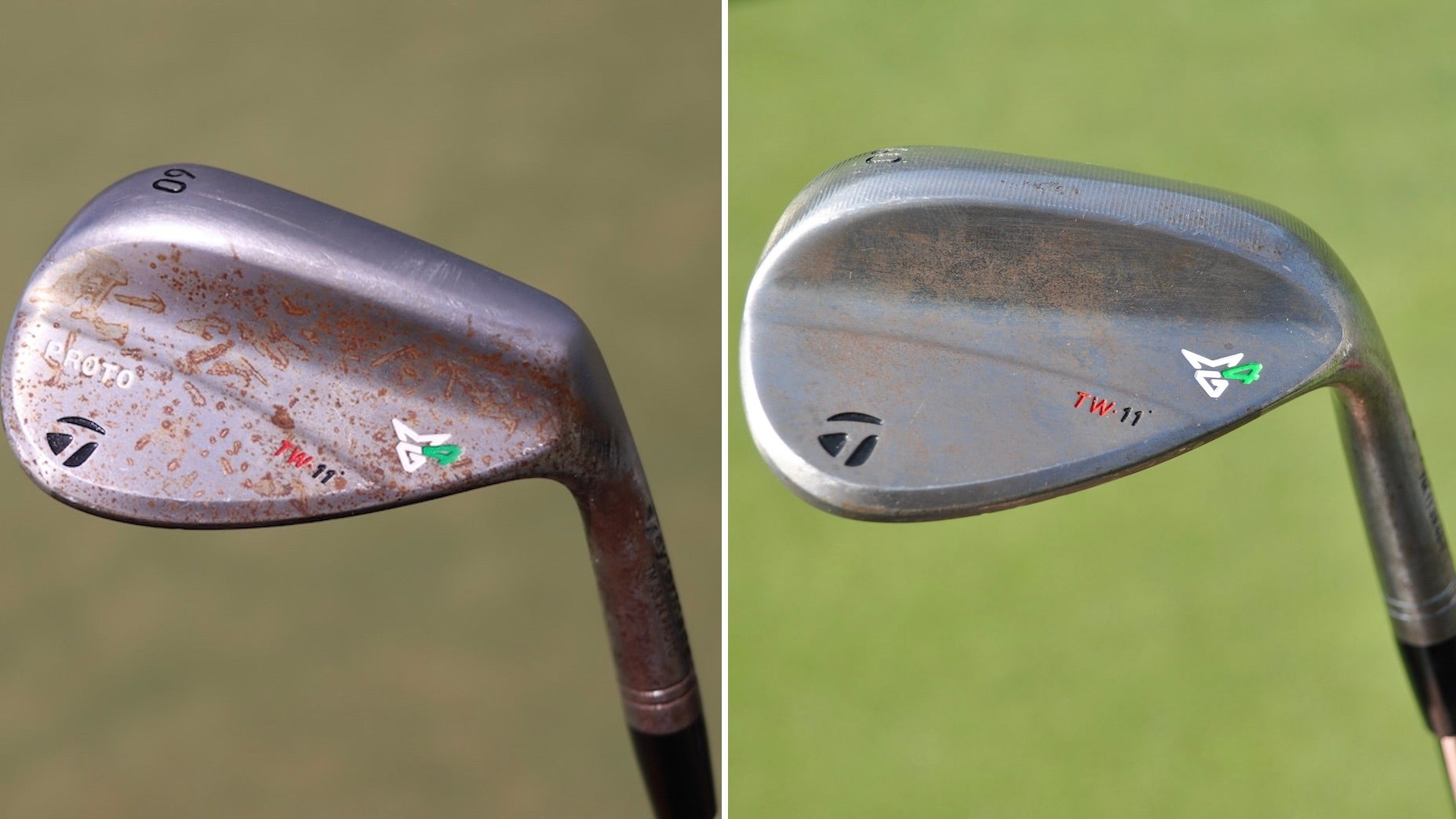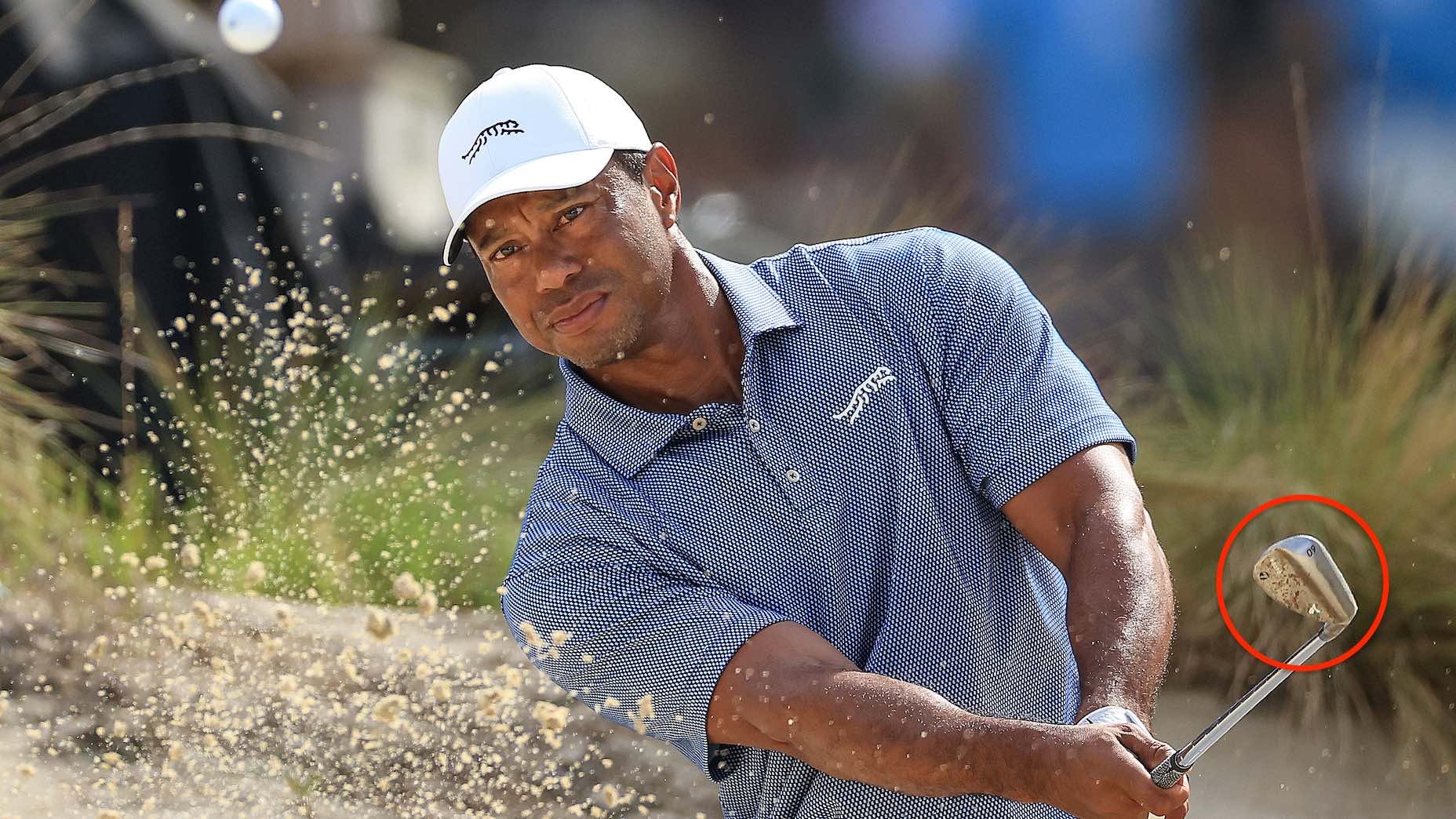Woods hits a bunker shot during a practice round at Pinehurst.
Getty Images
The U.S. Open marks the fourth time we’ve seen Tiger Woods this season. The sporadic appearances confirm what many assumed when the 15-time major winner made his return at this year’s Masters: It’s going to be the majors and a few events (benefitting his foundation) going forward. At this point, it’s best to enjoy something instead of nothing.
Fewer tournament reps allow Woods to focus completely on the next task at hand, which, in this case, is Pinehurst No. 2. Asked during his pre-tournament press conference to describe his prep work leading up to this week, Woods zeroed in on the one area of the game that’s sure to define the tournament come Sunday afternoon — the short game.
“I did a little bit of work on chipping and putting,” he said. “But nothing can simulate what we have here this particular week, the amount of little shots and the knobs and run-offs, and either using wedges or long irons or woods around the greens or even putter. There’s so many different shots that you really can’t simulate unless you get on the property. That’s one of the reasons I came up here last Tuesday, to be able to try and do that. Quite a bit of work. The golf course has firmed up and gotten faster since then.”

GolfWRX (L) | Jonathan Wall/GOLF (R)
Woods used everything from wedges and fairway woods to long irons and the putter to execute different shots during his practice rounds. Creativity and a short-term memory are key if you want to succeed around the green at Pinehurst. So, too, is understanding that equipment changes are sometimes necessary to handle different grasses — ultradwarf Bermudagrass from bentgrass, in Pinehurst’s case — and course conditions.
Woods rarely makes adjustments to the scoring tools in his bag for a major championship, but he’s making an exception for Pinehurst. Nestled in his staff bag this week are two TaylorMade MG4 wedges (56 and 60 degrees) with the word “Proto” stamped on each head. The wedges don’t look all that different from the previous set he had at the PGA Championship. However, a closer look reveals a couple of interesting alterations.
TaylorMade Milled Grind 4 Tiger Woods Custom Wedge
$199.99
The unique grind on each sole was designed by the artful hands of Tiger Woods. The 56° wedge is a dual sole with heavy heel relief, while the 60° has an extremely high bounce on the leading edge with a shaved heel. This makes it possible to open the face for flop shots, while still providing relief on the leading edge for better performance on tight lies. Designed for ultimate versatility, this setup allows Tiger to take on any shot, on any course, anywhere in the world.
IMPROVED SPIN IN WET CONDITIONS
Spin Tread technology utilizes laser etching to channel away moisture and help retain spin in wet conditions. The same way that tire treads help your car stay connected to the road, Spin Tread redirects water at impact and creates more friction between the club face and golf ball to impart more spin than prior generations.
REFINED SHAPING
MG4 features refinements in shape and visual appeal with a focus on what players perceive at address. Details from the hosel blend, offset and leading-edge straightness were all inspired by the insights and preferences of the best players and most experienced designers. Compared to the previous MG3, MG4 showcases a slightly larger footprint that provides players with a sense of roundness, smoothness and improved ease of use.
RAW FACE & NEW FINISH
There’s a reason raw wedges are preferred by the game’s best players. The unplated material will rust over time to preserve consistent spin while also delivering better performance in wet conditions. A new refined finish with a slightly darker tint minimizes glare and blends seamlessly with the raw face for a unified appearance.
View Product
The milled grind sole, at least for the moment, has been removed from each head. The same goes for the usual “TW Grind” Woods has used for years. These MG4 Proto wedges have a simpler sole design that’s flatter along the bottom with less trailing edge relief.
“Traditionally my soles have been pretty much standard in width, a little more rounded than some guys, just because I like to use different parts of the bounce, depending on what shot I’m going to use,” Woods told me in 2017. “But it really hasn’t changed that much in like 15 years or so. It’s been pretty much the same.”
So why would Woods change his wedge setup for a major championship? The answer can likely be found in his response to the way the “surrounds around the greens” have changed from his previous trips to Pinehurst in 1999 and 2005.
“I played it under bentgrass,” Woods said. “So now having Bermuda, it’s very different. It’s grainy. We had the grain on the greens during those Open Championships, and they were softer than they are now. Granted, I know the surrounds were burnt out in ’05, but the greens were not like what they are right now. That’s very different.
“The shot selections around the greens I think are more plentiful this year from either putting it to wedging it. As you said, 6- or 7-irons. I’ve used long irons and woods around the greens, and I’ve seen a number of guys do the same thing. There’s a lot of different shot selections, and the grain is going to play a big part of it.”
As short-game guru Parker McLachlin pointed out on social media, Woods is likely playing wedges with more bounce this week. That doesn’t mean it’s significantly more than the stated 11 degrees stamped on each head. Instead of adding leading and trailing edge relief to the wedges to make them play differently depending on how the head is positioned, the complex geometry appears to have been removed for a more traditional sole that could keep the leading edge height more consistent regardless of the shot.
Even though the areas around the green complexes at Pinehurst are extremely tight, the “grainy” Bermuda — especially if it’s into the grain — can cause the club to stick through impact.
In this case, adding forward shaft lean to the sand or lob wedge is going to lower the bounce, which can increase the potential for the dreaded chunk. Adding bounce ensures the wedge can get through the turf without issue. It’s a small adjustment that could pay big dividends for Woods when he needs to execute a deft wedge shot this week.



